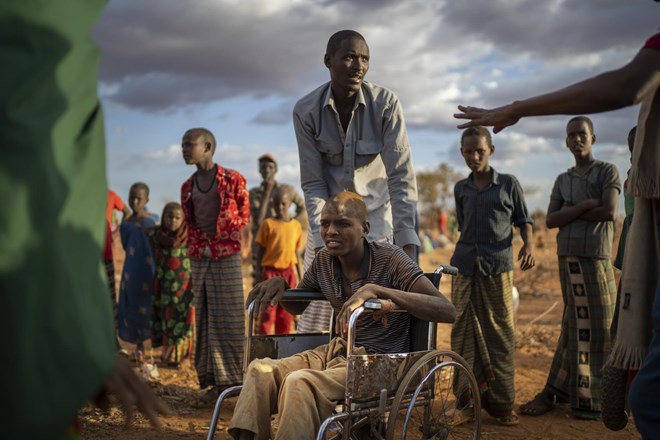
Saturday December 17, 2022
Interview by Leslie Mazoch
Associated Press photographers talk about their 2022 assignments, and share some of the stories behind the images.
FILE - Huts made of branches and cloth provide shelter to Somalis displaced by drought on the outskirts outskirts of Dollow, Somalia, Sept. 19, 2022. (AP Photo/Jerome Delay, File)
THE PLACE: Displacement camps, Somalia
THE STORY: ‘So many children dying’: Somalia drought brings famine near
THE PHOTOGRAPHER: Jerome Delay
ON THE POETRY RECITED BY SOME RESIDENTS OF THE CAMP, AND ON NOTICING THINGS:
My colleague Cara Anna had read somewhere that the Somalis were very fond of poetry. So she just set out to find people and ask around and see if people were writing poetry. She found a couple of women. I couldn’t understand what the lyrics were and what they were saying, since I was more concentrating on trying to see how I could illustrate the story and how I could make it fit into the package on famine and global warming. But it was something little that added a little piece of life in that bad situation. Which is always the kind of thing that you need to look for.
 FILE - Abdiyo Barre Ali, right and Abdiyo Ali Abdi recite poetry at a camp for displaced people on the outskirts of Dollow, Somalia, Sept. 21, 2022. (AP Photo/Jerome Delay, File)
FILE - Abdiyo Barre Ali, right and Abdiyo Ali Abdi recite poetry at a camp for displaced people on the outskirts of Dollow, Somalia, Sept. 21, 2022. (AP Photo/Jerome Delay, File)
When you’re not working alone, when you’re working with a writer and TV person and people start talking, you concentrate on the photography and the shooting. And maybe you don’t pay as much attention as you should to what people are talking about. I often joke that I’m a photographer because I’m shy. It’s not really true, but it does happen sometimes where the easy way out is just to hide behind a camera. But you have to be aware of what’s happening around you.
ON WHAT SURPRISED HIM ABOUT THIS ASSIGNMENT AND THE CAMP:
Everybody has a cell phone. So communication is incredible. There might be more cell phones in Somalia than anywhere else in the world per capita. It’s incredible. It’s also one of the reasons how people know where to go. You’ll have a family from a village and they’ll say, “Hey, come here, and there is plenty of space, and the U.N. is feeding us.” The mass communication, the way people communicate long distances, that didn’t happen before. They’re all on WhatsApp, and they have access to a lot more information now.
 FILE - Displaced people who have arrived at a camp wait for plot allocation on the outskirts of Dollow, Somalia, Sept. 19, 2022. (AP Photo/Jerome Delay, File)
FILE - Displaced people who have arrived at a camp wait for plot allocation on the outskirts of Dollow, Somalia, Sept. 19, 2022. (AP Photo/Jerome Delay, File)
ON THE ETHICS OF PHOTOGRAPHING IN CAMPS:
When you barge into a camp with a camera, there is always that guilt feeling that you take things from people. You take the picture, and you try to justify it by saying, “Well, you’re giving them a voice, you’re telling their story to the world.” If I was in their shoes, I could care less about somebody taking my picture. I’d want somebody to bring me food and offer security. That is something that everyone deals with differently. But it doesn’t mean that we shouldn’t do it. I think we must do it.
 FILE - Fartum Issack sits in a shelter at a camp for displaced people on the outskirts of Dollow, Somalia, Sept. 19, 2022. Issack and her husband carried a small body along a dusty track to a graveyard. Their 1-year-old daughter had arrived at camp sick and hungry. She was rushed for treatment, but it was too late. (AP Photo/Jerome Delay, File)
FILE - Fartum Issack sits in a shelter at a camp for displaced people on the outskirts of Dollow, Somalia, Sept. 19, 2022. Issack and her husband carried a small body along a dusty track to a graveyard. Their 1-year-old daughter had arrived at camp sick and hungry. She was rushed for treatment, but it was too late. (AP Photo/Jerome Delay, File)
ON THE LOSS OF BABIES IN THE CAMPS:
We are always facing situations where people do lose family members and kids. The kids are the weakest. And if starvation doesn’t get them, malaria can, or all kinds of diseases and malnutrition. But the thing that struck me the most in this situation was the cemetery where the kid was buried — where we went — and she showed us with her husband. The place that has been set by the local authorities as the cemetery was about the size of three or four football fields. And by that time there were only 13 graves. So somebody anticipated a major disaster in the making. Somebody went to planning and said, “Well, this could get really, really, really ugly.” I was kind of pushing for going back at some stage to revisit that place. One thing striking was what seems to be the lack of emotion — the way we would imagine somebody who’d just lost a baby would react. Emotions there are kept very private. Everything is more quiet. More internalized, I would say. I think there’s joy when a baby survives. And that is a celebration.

FILE - A child is weighed at a camp for displaced people on the outskirts of Dollow, Somalia, Sept. 19, 2022. (AP Photo/Jerome Delay, File)